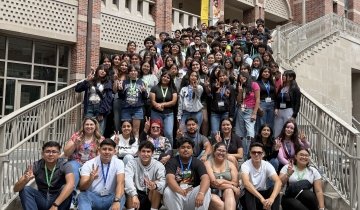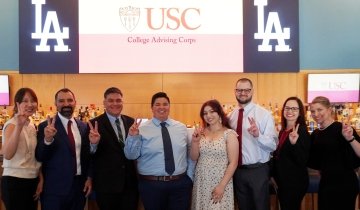USC Rossier’s first “Data Party” featured guest speaker Dr. Jeffrey Duncan-Andrade.
His presentation shared outcomes of his ethnographic research conducted in Los Angeles. He identified three distinct dispositions of educators:
- Those who are deeply committed to the education of all students as evident by their actions;
- Those who profess a strong commitment but find it hard to deliver; and
- Those whose resentment about the conditions and people they encounter lead to further inequities and injustice.
The talk concluded with the identification of five elements of effective urban teaching: critically conscious purpose, strong preparation, knowledge of the urban culture, hope, duty and trust. His afternoon presentation challenged Rossier to think about:
- Who we serve;
- The root causes of educational inequity;
- How we should respond to these causes; and
- How we can measure our impact.
Dr. Duncan-Andrade’s final segment presented a cycle of voluntary peer observation and lesson study that professors can engage in to improve their instruction and choices of pedagogy.
Tuesday’s guest speaker, Dr. Alicia Dowd, co-director of the USC Rossier School of Education’s Center for Urban Education (CUE), spoke on elements of the “Equity Scorecard”, a tool CUE has developed to build institutional equity-mindedness in colleges. It provided compelling tools for faculty to consider when constructing syllabi and course curricula. She presented sample course syllabi from several other schools of education that CUE works with and engaged the community to apply the CUE equity criteria. Dr. Dowd illustrated how such activities have changed the lens for course development and instructional improvement for the Center and its partners.
Whole group discussions and small group dialogues were facilitated and illustrated by Jeannel King, for documentation that can reviewed and integrated into ongoing program assessment.
In all, the two-day event offered faculty and staff the opportunity to ask critical questions and suggest some strategies and tools to consider as the School moves forward with an inquiry minded approach to the Rossier strategic plan.



